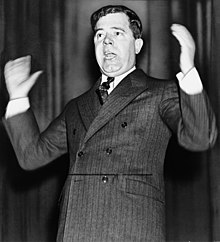List of allegations of misuse of the Internal Revenue Service

This is a partial list of allegations of misuse of the United States Internal Revenue Service (IRS), which traces its roots to the creation of the Commissioner of Internal Revenue in 1862. Examples of political profiling controversies include cases in which IRS employees or government officials have allegedly used IRS resources to target individuals and groups for espousing or expressing particular political beliefs.
Roosevelt administration
[edit]
Use of the IRS for political targeting has been alleged as far back as the Franklin D. Roosevelt administration. To discredit political opponent Huey Long and damage his support base, Roosevelt had Long's finances investigated by the Internal Revenue Service in 1934.[1]
"My father," Elliott Roosevelt observed of his famous parent, "may have been the originator of the concept of employing the IRS as a weapon of political retribution."[2]
1940s–1960s
[edit]The most famous Kennedy administration project allegedly deploying tax-related targeting was called the "Ideological Organizations Project". This was a project which allegedly investigated, intimidated, and challenged the tax-exempt status of right-wing foundations.[3]
Many instances of alleged political profiling were coordinated with the Federal Bureau of Investigation (FBI), sometimes under COINTELPRO.[4] The IRS provided the FBI with free access to tax returns, which the FBI used to investigate groups as ideologically varied as the John Birch Society, the National Association for the Advancement of Colored People, and the American Communist Party.[5]
Beginning in the 1950s and continuing into the 1960s, the IRS audited civil rights leader Martin Luther King Jr. numerous times.[6][7] In addition to King himself, the Southern Christian Leadership Conference and several of King's lawyers were subjected to audits.
Nixon administration
[edit]In 1974, a Bill of Impeachment against President Richard Nixon was approved by the House Judiciary Committee that included charges that his administration attempted to use the IRS in a discriminatory manner:
- RESOLVED, That Richard M. Nixon, President of the United States, is impeached for high crimes and misdemeanours...
- Using the powers of the office of President of the United States, Richard M. Nixon, in violation of his constitutional oath faithfully to execute the office of President of the United States...
- He has, acting personally and through his subordinates and agents, endeavoured to... cause, in violation of the constitutional rights of citizens, income tax audits or other income tax investigations to be initiated or conducted in a discriminatory manner.[8]
Clinton administration
[edit]Conservative groups, including The Heritage Foundation, the National Rifle Association of America, and Judicial Watch alleged that the Clinton administration subjected them to politically motivated audits.[9]
In September 1992, Paula Jones who had filed a civil lawsuit against Bill Clinton alleging sexual harassment was audited by the IRS and alleged it was politically motivated. Clinton press secretary Mike McCurry denied that the White House had any involvement.[10][11] Juanita Broaddrick who accused Clinton of raping her was also audited by the IRS and told the New York Post, “I do not think this was a coincidence”. Broaddrick's lawyer Larry Klayman filed a complaint with the inspector general of the Treasury Department.[12]
In May 1993, Clinton's associate White House counsel William H. Kennedy met with FBI agents at the White House, where he asked them to investigate Billy Dale, who had been fired from the White House travel office. The agents hesitated investigating Dale, saying that there was not sufficient evidence to justify an investigation, but they agreed to investigate after Kennedy told them that he would turn to the Internal Revenue Service for help if they didn't investigate. Republican Party opponents of the Clintons alleged that Kennedy pressured the agents. A White House internal review criticized Kennedy's actions.[13]
Bush administration
[edit]The NAACP was audited in 2004 after its chairman criticized then-President George W. Bush for failing to address the group, becoming the first president to do so since Herbert Hoover.[14] The IRS informed the NAACP that the audit was prompted by then-NAACP-chairman Julian Bond's speech, which "condemned the administration policies of George W. Bush on education, the economy and the war in Iraq."[15] Although the IRS maintained that the audit was an attempt to determine whether the NAACP had involved itself in a political campaign, the NAACP and Democratic Party representatives characterized the audit as an attempt to stifle criticism of Bush, intimidate NAACP members, and harm the NAACP's get-out-the-vote campaign.[14][15]
According to the Huffington Post in 2004, the Wall Street Journal reported that the IRS audited the liberal group Greenpeace at the request of Public Interest Watch, a group funded by Exxon-Mobil.[16] Exxon-Mobil said it was not aware of the IRS audit, nor did it have a role in initiating the audit.[17]
According to the Tampa Bay Times PolitiFact the allegation that the IRS during the Bush administration targeted liberal groups is "Mostly False".[18]
Obama administration
[edit]
In May 2013, the IRS admitted it had subjected conservative political groups to closer scrutiny in their applications for tax-exempt status based on particular keywords in their names. The agency has maintained that low-level employees took it upon themselves to do this.[19][20] However, Republicans argue that the refusal of Lois Lerner (at the time was Director of the IRS's Exempt Organizations Unit) to testify before Congress, twice citing her Constitutional right against self-incrimination, suggests involvement by higher-level employees.[citation needed] An internal report by the agency's Inspector General cited "ineffective management" as the cause and indicated that the IRS "will need to do more so that the public has reasonable assurance that applications are processed without unreasonable delay in a fair and impartial manner in the future."[21] Congress continues to investigate the possibility that Lerner or other high-level officials were involved in improper political targeting. Republican lawmakers say the IRS has improperly withheld and destroyed evidence, while Democrats argue that Republicans are attempting to keep the controversy alive for political purposes.[citation needed]
Trump administration
[edit]President Donald Trump may have illegally targeted political enemies James Comey and Andrew McCabe with IRS audits.[22]
References
[edit]- ^ Aubin, Dena (May 16, 2013). "Factbox: IRS's rich history of scandals, political abuse". Reuters. London. Archived from the original on June 15, 2020. Retrieved June 14, 2020.
- ^ Folsom, Burton W. (November 17, 2009). New Deal Or Raw Deal?: How FDR's Economic Legacy Has Damaged America. Simon and Schuster. p. 146. ISBN 9781416592372 – via Google Books.
My father," Elliot Roosevelt observed of his famous parent, "may have been the originator of the concept of employing the IRS as a weapon of political retribution.
- ^ Andrew, John A., III (2002) Power to Destroy: The Political Uses of the IRS from Kennedy to Nixon
- ^ Scherer, Michael (14 May 2013). "IRS Scandal Echoes a Long History of Political Harassment". Time. Retrieved 2013-05-15.
- ^ "History of IRS Abuse: American Communists". Real Clear Politics. Retrieved 30 May 2013.
- ^ Burnham, David (1989). "MISUSE OF THE I.R.S.: THE ABUSE OF POWER". The New York Times Magazine. Retrieved 30 May 2013.
- ^ "History of IRS Abuse: Martin Luther King Jr". Real Clear Politics. Retrieved 30 May 2013.
- ^ "Watergate Articles Of Impeachment". Watergate.info. Archived from the original on May 17, 2012. Retrieved 2013-05-14.
- ^ "History of IRS Abuse: Paula Corbin Jones". Real Clear Politics. Archived from the original on May 8, 2014. Retrieved 30 May 2013.
- ^ Broder, John M. (1997-09-16). "White House Denies Seeking I.R.S. Audit of Clinton Accuser". The New York Times. ISSN 0362-4331. Archived from the original on June 13, 2013. Retrieved 2023-05-12.
- ^ "washingtonpost.com: IRS Audit of Paula Jones Is 'Harassment,' Adviser Says". www.washingtonpost.com. Archived from the original on September 21, 2005. Retrieved 2023-05-12.
- ^ Brian Blomquist (2000-05-31). "JUANITA LATEST BILL FOE TO BE AUDITED". Archived from the original on July 9, 2022. Retrieved 2023-05-12.
- ^ "Washingtonpost.com: For White House Travel Office, a Two-Year Trip of Trouble". www.washingtonpost.com. Retrieved 2023-11-16.
- ^ a b Kelly Brewington (29 October 2004). "NAACP blames tax audit on criticism of Bush". The Baltimore Sun. Retrieved 30 May 2013.
- ^ a b Kelly Brewington (30 October 2004). "Democrats denounce IRS audit of NAACP". The Baltimore Sun. Retrieved 30 May 2013.
- ^ Bob Cesca (16 May 2013). "10 Examples of Bush and the Republicans Using Government Power to Target Critics". Huffington Post. Retrieved 24 January 2015.
- ^ Steve Stecklow (21 March 2006). "Did a Group Financed by Exxon Prompt IRS to Audit Greenpeace?". Wall Street Journal. Retrieved 24 January 2015.
- ^ Jon Greenberg (6 June 2013). "IRS targeted liberal groups during Bush years, says Jim McDermott". Tampa Bay Times. Retrieved 24 January 2015.
- ^ "The IRS scandal unwinds". Columbia Journalism Review. Retrieved 2023-05-12.
- ^ "IRS Look at Progressive Groups Complicates Controversy - Bloomberg". Bloomberg News. 2013-12-07. Archived from the original on 2013-12-07. Retrieved 2023-05-12.
- ^ Farnham, Alan. "IRS Has Long History of Political Dirty Tricks". ABC News. Retrieved 2020-06-12.
- ^ "IRS in political storm over Trump-era audits". 7 July 2022.
